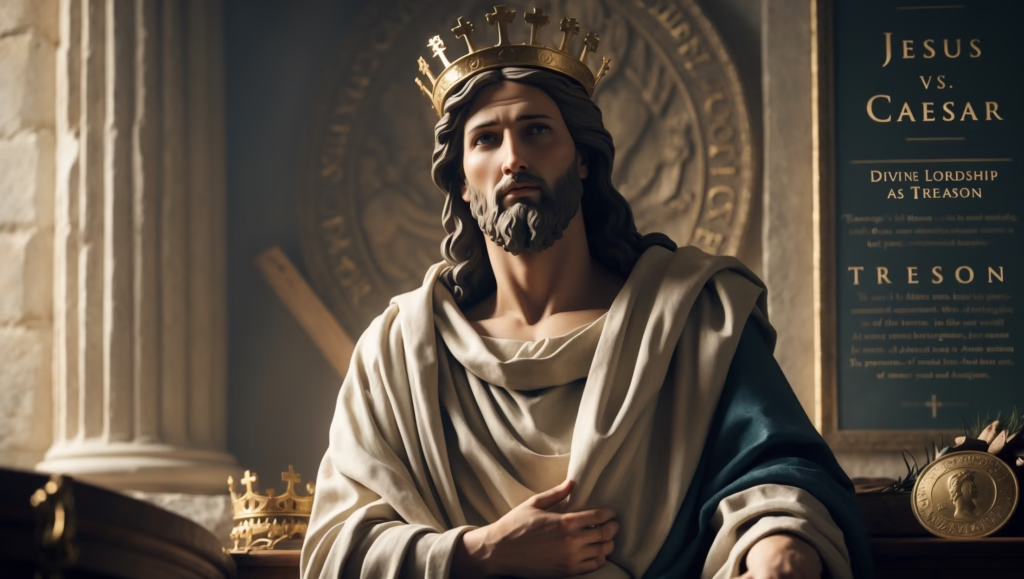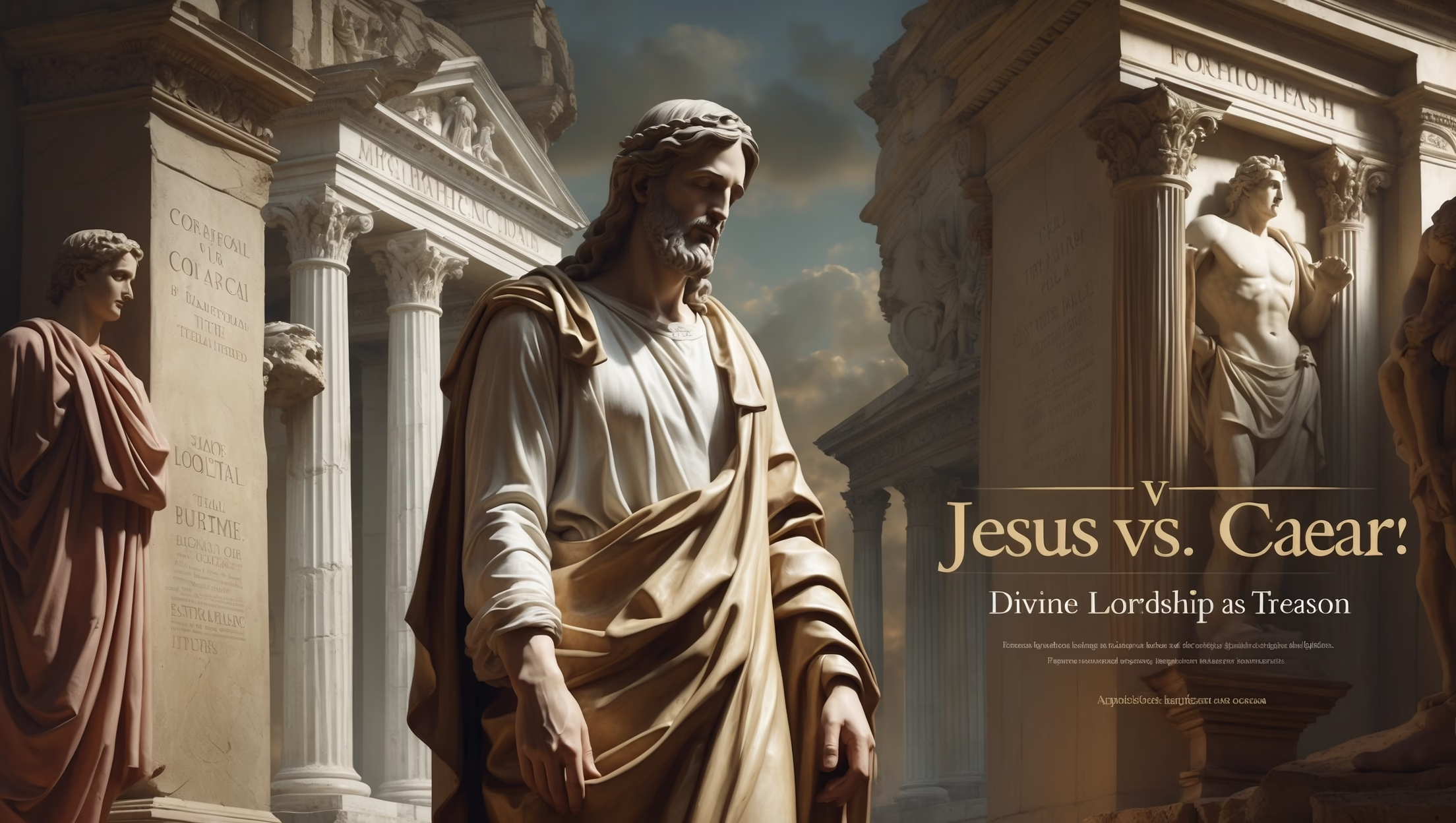One of the most politically explosive aspects of early Christianity was its claim that Jesus Christ, not the emperor, was Lord. In the Roman world, acknowledging Jesus as Kyrios (Greek for “Lord”) was more than a religious confession—it was a radical political statement that could be construed as treason. Understanding this claim sheds light on why early Christians were persecuted and why the message of Christ was both spiritually and socially subversive.

The Imperial Cult: Caesar as Divine Authority
By the time of Jesus’ ministry and the early church, the Roman Empire had institutionalized a complex system of emperor worship:
- Tiberius’ Title: As emperor, Tiberius was referred to as Divi filius, or “Son of the Divine Augustus,” asserting a quasi-divine status inherited from Augustus.
- Pontifex Maximus: The emperor held the title of “chief priest,” merging religious and political authority in one office.
- Coins and Inscriptions: Roman currency frequently depicted the emperor with divine symbols, reinforcing the expectation that citizens would recognize the emperor’s ultimate authority.
In this context, loyalty to Caesar was considered both a civic and religious duty. To claim that another figure—Jesus—was Lord directly challenged the emperor’s authority and threatened the social order.
Jesus as Lord: A Radical Confession
Early Christians did not separate their spiritual devotion from political reality. The baptismal formula “Jesus is Lord” (Kyrios Iesous) carried profound implications:
- Spiritual Authority: Acknowledging Jesus as Lord affirmed His divinity and messianic role.
- Civil Subversion: In a society where Caesar was the de facto divine authority, this statement implicitly denied the emperor’s supremacy.
- Communal Identity: Christians formed a countercultural community that answered to a higher authority than the empire.
The apostle Paul’s letters reflect this tension. In Philippians 2:10-11, Paul writes: “that at the name of Jesus every knee should bow, in heaven and on earth and under the earth.” The imagery of universal worship mirrors imperial rhetoric, turning the political logic of Caesar’s lordship on its head.
The Crucifixion: Political Consequence of Divine Claim
The charge that led to Jesus’ execution—claiming to be “King of the Jews” (John 18:33-37)—was both religious and political:
- Treason in Roman Eyes: Any claim to kingship threatened Roman governance and public order.
- Pontius Pilate’s Dilemma: Historical sources portray Pilate as cautious, understanding the claim’s political sensitivity. The crucifixion was a direct result of the perceived insurrection against Caesar’s authority.
- Subversion Through Death: Even in death, Jesus’ lordship challenged the empire: His resurrection reinforced the supremacy of a spiritual kingdom over temporal powers.
Early Christian Resistance
The political implications of Jesus’ lordship extended beyond the crucifixion:
- Baptismal Confession: Saying “Jesus is Lord” was itself a declaration of loyalty to the risen Christ rather than the emperor.
- Christian Communities: They formed alternative centers of authority, prioritizing obedience to Christ over civic demands such as sacrifices to Caesar.
- Persecution: Roman authorities recognized the subversive potential of these communities, resulting in waves of persecution from Nero onward.
Even without wielding armies or political offices, Christians’ theological claims posed a radical threat to Roman authority.
Modern Parallels
The tension between allegiance to God and allegiance to political authority is not merely historical:
- China’s Religious Policy: Modern observers note that Christians, Muslims, and other religious groups face scrutiny when devotion appears to challenge state authority—echoing the ancient conflict between Caesar and Christ.
- Conscientious Objection: Across centuries, Christians have resisted state demands conflicting with divine commands, from refusing military service to challenging unjust laws.
- Global Implications: The principle remains: acknowledging Jesus as Lord involves a form of ultimate loyalty that transcends political structures.
Why This Matters for Contemporary Faith
- Theological Insight: Jesus’ lordship affirms His cosmic and moral authority, not limited by temporal powers.
- Historical Understanding: Early Christian persecution was rooted in political realities as much as theological differences.
- Practical Reflection: Modern believers navigate tension between faith and civic obligations, learning from early Christians how to live faithfully under authority.
Conclusion
The declaration “Jesus is Lord” was more than pious devotion—it was a revolutionary, treasonous claim in the Roman Empire. By elevating Christ over Caesar, early Christians forged a spiritual kingdom that transcended political boundaries. The crucifixion and resurrection reveal that true lordship is not enforced by armies or decrees but by obedience, moral authority, and transformative love.
Even today, this ancient tension invites believers to reflect on the cost of allegiance to God and the courage required to uphold faith in the face of competing powers. The story of Jesus versus Caesar reminds us that divine loyalty is ultimate, shaping both personal ethics and communal identity across cultures and centuries.








